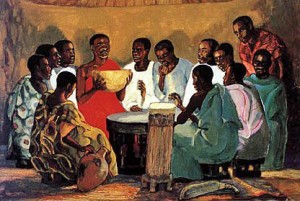Contributed by Pastor Scott A. Moore
Eisleben, Germany
 Warm-up Question: What do you eat or drink when you need energy real fast? And, when you need long-lasting energy?
Warm-up Question: What do you eat or drink when you need energy real fast? And, when you need long-lasting energy?
Once again, it is very cool to be a vampire.
The recent best-seller series, Twilight, with a second movie installment on the way, and the HBO series True Blood (adapted from the Southern Vampire Mysteries, novels written by Charlaine Harris) prove the public’s thirst for this most sanguine of themes.
These stories have not just filled the imaginations of many young people (not to mention quite a few older folk), they have also worked very hard to help us see the mysterious and supernatural in our hum-drum, everyday (read: boring) lives. Beautiful, interesting, and extremely talented vampires in our towns and in our schools… a much better sell than in the days of dreary Transylvania with a pasty-complexioned man wearing an old, dusty tuxedo who sleeps in a coffin and says, “I vant to zuck your bloooood” and then turns into a bat and flies away.
Where the Twilight story is satisfied with living within its created fantasy world, the creators of True Blood have decided to work at blurring the line between that Southern fantasy world and the world in which we live. HBO, with the help of the marketing firm, Digital Kitchen, created 30 fake ads for products by real companies we all know, all geared for those blood drinkers living among us. This campaign is striving to create an air of authenticity in order to help viewers believe the story.
Discussion Questions
- Where you afraid of vampires as a little kid?
- What do you find intriguing or repulsive about the vampire legends in general?
- What do you appreciate about the particular vampire stories that are told in Twilight or True Blood?
- Why do you think there is such a huge interest in the vampire legends these days?
- What do you imagine living forever would look like? What would you be willing to do in order to achieve that? Where would you draw the line?
Scripture Texts (NRSV) for Sunday, August 16, 2009.
(Text links are to oremus Bible Browser. Oremus Bible Browser is not affiliated with or supported by the Evangelical Lutheran Church in America. You can find the calendar of readings at Lectionary Readings.)
For lectionary humor and insight, check the weekly comic Agnus Day.
Gospel Reflection
In the first years of the Church, after Jesus ascended into heaven, the disciples did what he commanded them to do. They made disciples by teaching and baptizing, they preached, and they gathered around the table and shared in that special meal Christ instituted for them known by a variety of  names: the Lord’s Supper, Holy Communion, Eucharist, just to name a few. Jesus says in the Gospels of Matthew, Mark, and Luke, “take and eat, this is my body… take and drink, this is my blood”. And here in the Gospel of John, Jesus says, “‘Very truly, I tell you, unless you eat the flesh of the Son of Man and drink his blood, you have no life in you. Those who eat my flesh and drink my blood have eternal life, and I will raise them up on the last day; for my flesh is true food and my blood is true drink. Those who eat my flesh and drink my blood abide in me, and I in them.”
names: the Lord’s Supper, Holy Communion, Eucharist, just to name a few. Jesus says in the Gospels of Matthew, Mark, and Luke, “take and eat, this is my body… take and drink, this is my blood”. And here in the Gospel of John, Jesus says, “‘Very truly, I tell you, unless you eat the flesh of the Son of Man and drink his blood, you have no life in you. Those who eat my flesh and drink my blood have eternal life, and I will raise them up on the last day; for my flesh is true food and my blood is true drink. Those who eat my flesh and drink my blood abide in me, and I in them.”
The Jewish leaders in our Gospel story ask the question that has troubled believers and non-believers alike for centuries: “How can this man give us his flesh to eat?” How indeed? The idea of really eating Jesus’ flesh and drinking his blood has bothered many for 20 centuries. It seems somehow really gross.
We don’t seem to be too bothered, however, by the idea of this kind of eating and drinking when we think about Edward Cullen or Jessica Hamby eating flesh or drinking blood (and yes, all of the die-hard vampire fans will say, “They only drink blood!”). It doesn’t seem to gross us out that much. We shy away from really trying to sit with the idea of what that means when we think about the miracle-working and eternal Son of God, who doesn’t need to eat and drink but instead gives himself for our consumption. Jesus is like the anti-vampire, who lives and gives his life for those who feast on him. It is easier to quickly think about Jesus words as a mere signs. He couldn’t have really meant what he said, could he?
A good question for those of us who celebrate the death and resurrection of Jesus by sharing in this special meal might be: why do we believe and teach these strong and vivid words of eating and drinking Jesus if there isn’t something more going on than eating some bread and drinking some wine? Why would Jesus say, “this is my flesh, this is my blood… those who eat of my flesh and drink of my blood have eternal life… my flesh is true food and my blood is true drink”?
There are certainly many ways to twist and turn Jesus’ words in order to make them more palatable or easy to digest. We do know, however, that Jesus gave himself to us. Not only in the cross, not only in the words we share, but also in a meal. Bread and wine, broken and shared. Christ’s true body. Christ’s true blood. It doesn’t get more authentic than that.
Discussion Questions
(Information on communion in ELCA Worship’s FAQs. Some of these FAQs may be helpful background for your discussion.)
- What do you think about when you receive (or watch others receive) communion?
- Why do you think Jesus shared his body and blood with the world this way?
- What form of “bread and wine” do you prefer or think is best? (wafers, bread, wine, grape juice) Why?
- What different forms of receiving the bread and wine of Eucharist have you experienced? (at a rail, passing and giving to each other, separate small cups of wine, common cup, intinction, kneeling, standing, walking by a “station”, etc.) Which do you prefer or think is best? And why?
- How would you explain Communion/Eucharist/Lord’s Supper to a friend who doesn’t know what Christians do?
Activity Suggestion
Same-day activity
Learn how to set the table/altar for Eucharist. With help from someone in your congregation, see what your congregation uses for wine and bread. Find out what all the various things on the altar/table are and what they mean.
Few-day activity
Make a communion set for your congregation out of pottery or wood. There are lots of opportunities to talk about the meaning of the Eucharist during this kind of activity.
Long-term activity
Train and send participants either for a one-time experience or as permanent members on home communion visits. If you do not have this kind of ministry, talk about establishing one.
Closing Prayer
O God, who sustains and upholds us, we hunger and thirst for you in our lives. Feed us with your love, feed us with your truth, and feed us with the life-giving power of your Son, Jesus Christ, the Bread of Heaven. In the name of Christ, we pray. Amen.
